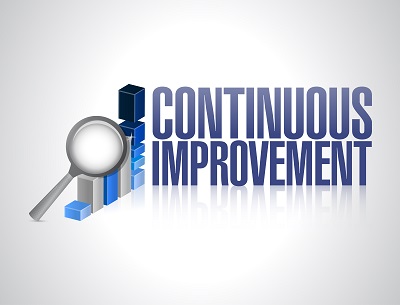Ricoh is a global technology company, best known for its familiar range of office equipment and services including printers, projectors, document management systems and IT services. Headquartered in Sydney, Ricoh Australia maintains branches in all mainland capital cities.
New services herald a time of change
In the last five years, Ricoh’s Australian operations have been through enormous change. Acquisitions and expansion into new markets, including the development of highly successful professional services and IT services arms, have resulted in the company doubling in size since 2010. Headcount has risen to over 1,100 employees. Major new customers have signed on with the company. To accommodate their needs, many new processes have been developed and old ones changed.
Declan O’Reilly, Business Excellence Manager, describes it as an exceptionally busy period and one that has been dramatic in terms of change.
Maintaining quality
Part of the reason for Ricoh’s success is the company’s commitment to quality. O’Reilly oversees an Excellence Group which is tasked with ensuring adherence to quality and compliance requirements, including the internationally recognized certifications ISO 9001, ISO 14001, ISO 27001 and the CarbonZero environmental standard which attests to Ricoh’s carbon neutral operations.
To manage quality processes, Ricoh has long relied on an internally developed quality management software system. Created a number of years ago, O’Reilly admits the system was disparate, with information stored in a variety of places, and there was also no clear-cut ownership of processes.
“We had procedures stored in one location, processes in another and forms in another. This made it cumbersome to maintain. With all the change at Ricoh over the past few years, we were struggling to keep the quality system up to date,” O’Reilly notes.
The growing workforce had highlighted another problem: communication. “We have lots of sales staff and technicians out in the field, and it was hard to convey information to them. We were also facing increasing challenges communicating processes whenever we brought new staff on board,” O’Reilly explains.
Process ownership belongs with the subject matter experts across the business
Towards the end of 2014, O’Reilly’s team decided the time was ripe to replace the quality system with a new tool, one that would allow procedures and processes to be more easily introduced and maintained. The tool had to empower all the different areas of the business, so that each group could take back control and ownership of their relevant procedures and processes.
“Our logic was that the people in each business area are the subject matter experts, so they are the ones best placed to take on ownership and maintenance of procedures,” O’Reilly points out.
To avoid problems with outdated or inaccurate processes, O’Reilly’s team wanted a system that would enable them to impose dates for review of content. It also had to solve communication problems by making process information accessible to all employees, including those working out in the field.
The tool chosen to help achieve this was Promapp, a cloud-based process management software solution. To test its suitability, Ricoh began with a one month pilot project involving ten subject matter experts representing four areas of the business.
The software enabled the team to create a library of frequently used acronyms and terms, removing any ambiguity and making it easy for new users to understand exactly what was being described in each process.
It also allowed information systems to be included as part of the procedure documentation. “The benefit of this is that it helps us to see where systems are being used and how widely they are being used. It’s useful in terms of managing access to those systems and it’s a requirement for compliance with our information security standard,” O’Reilly adds.
A feedback mechanism, which allows any user to provide feedback or suggest changes, and the ability to share information simply by emailing links to procedures were also highly appreciated.
There was one other major benefit that became apparent within the first two weeks. The ability to nominate an expert within the procedure removed any doubt about ownership and ensured users could easily identify who to turn to if they needed more information.
Moving to customer centric processes
Promapp has become the single source of knowledge within Ricoh. And the migration itself has given Ricoh teams an opportunity to update processes and re-design them, structuring them in a customer-centric manner rather than viewing them by team responsibility.
“Users can follow the customer life cycle – from how we launch a machine, to how we sell it to the customer, how we fulfil orders, bill customers, provide service over the course of the machine’s life and how we collect the machine at the end of its life. This is changing the mindset around the company and helps to ensure a consistent experience for the customer, no matter who they deal with,” he notes.
The depth of content and the explanations captured are also making the system a key tool during the induction of new employees, providing a standard experience and consistent messaging. Content owners can add screen shots and videos to illustrate how new products or procedures work.
Some teams have taken it upon themselves to create content regarding procedures tailored for certain customers. This has allowed Ricoh to centrally capture information about specific customer requirements such as how a company needs to be billed, the protocol for service calls, or delivery arrangements. Customers are invited to provide feedback on the content, and this is sent directly to the relevant teams in charge of the procedure. “Teams have taken this approach one step further by socializing the procedures with customers to ensure the information is captured accurately. Customers love this degree of transparency.”
A future of continuous improvement
Some of the benefits the Ricoh team have already realized include streamlined operational and compliance management, improved communication with staff in the field, a more consistent customer experience and faster onboarding of new staff.
And O’Reilly expects the pace of change to continue to increase
.
“We expect to continue to get feedback from users and customers, and that in turn will enable us to keep on improving our knowledge, content and procedures. We’re also hoping it will simplify the process of conducting external audits for quality standards, and for any financial audits,” O’Reilly concludes.

















